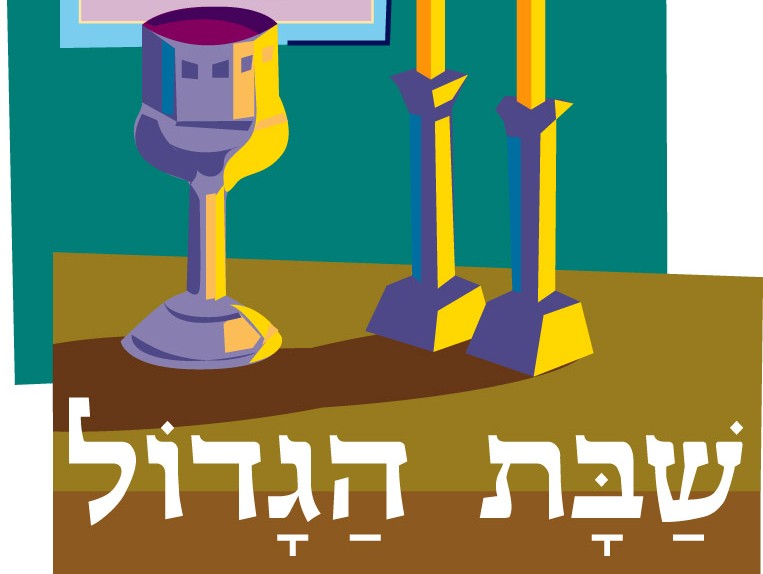Bonjour / Hello [nickname_else_first_name]
This weekend is Shabbat Hagadol
Shabbat HaGadol ("Great Shabbat" שבת הגדול) is the Shabbat immediately before Passover. The first Shabbat HaGadol took place in Egypt on 10 Nisan five days before the Israelite Exodus
-Wikipedia
Table of contents
1) Perashat Hashavoua - Rabbi Eli Mansour
2) Halakhat Hashavoua - Halachot Hodesh Nissan - David Azerad
3) Holy Jokes!
1)PERASHAT HASHAVOUA
This Week's Parasha Insight with Rabbi Eli Mansour
Shabbat HaGadol: The Power of Mesirut Nefesh
The Shabbat before Pesach is famously called "Shabbat Ha’gadol" – "the Great Shabbat." The most common explanation for this name is that offered by the Tur (Rabbenu Yaakob Ben Asher, Germany-Spain, 1269-1343), who writes that this Shabbat commemorates a miracle which occurred on the last Shabbat before the Exodus from Egypt. As the Torah tells in Parashat Bo, G-d commanded Beneh Yisrael to select a sheep for the Korban Pesach (paschal sacrifice) on the 10th of Nissan – four days before it was to be slaughtered, the afternoon of the 14th of Nissan. That year, the 10th of Nissan fell on Shabbat. The Egyptians regarded sheep as a sacred article, and so when they saw Beneh Yisrael preparing sheep, they naturally approached them and asked what this was about. Beneh Yisrael proudly and unabashedly proclaimed that they were preparing sheep to be sacrificed to the one, true G-d. This was, quite obviously, an affront to the Egyptians’ faith, and they were incensed. Miraculously, however, they felt helpless, and did nothing to harm Beneh Yisrael. This is the great miracle that we commemorate on Shabbat Ha’gadol.
The commentaries elaborate further on the significance of these events which transpired on the Shabbat before the Exodus.
Many years earlier, G-d had informed Abraham Abinu of His decree that Abraham’s descendants would be enslaved and oppressed for 430 years. As we know, however, G-d brought Beneh Yisrael out of Egypt after they had been there for just 210 years. Moreover, according to tradition, the period of harsh labor lasted just 86 years – from the time of the birth of Miriam, Moshe’s sister, until the Exodus. This means that Beneh Yisrael endured just one-fifth of the decreed period of oppression (86 is one-fifth of 430). G-d saw that if Beneh Yisrael had remained in Egypt any longer, they would have been fully assimilated into Egyptian society, and would not have been able to be redeemed. Over the course of their stay in Egypt, Beneh Yisrael adopted the Egyptians’ pagan beliefs and practices, to the point where had they remained any longer, they would never have spiritually recovered from their depths of paganism and immorality. G-d therefore mercifully brought them out of Egypt much earlier than they were to have been redeemed.
This is one of the reasons for the Misva of Arba Kosot – the four cups of wine we drink at the Seder. The word "Kos" ("cup") in Gematria equals 86, and thus the four cups of wine represent the four-fifths of the 430 years which were deducted from the amount of years that the bondage was to have endured. We drink these four cups to celebrate the 344 years of suffering which our ancestors were spared.
The question, however, arises, as to how the decree could be changed. If Beneh Yisrael were to endure 430 years of harsh labor, how could G-d have freed them after only 86 years?
The answer, the commentaries explain, is found in the events of Shabbat Ha’gadol.
We need to appreciate the great self-sacrifice that Beneh Yisrael displayed at that time. Despite still living under Egyptian rule, and having been submerged in Egyptian beliefs and culture for so long, they mustered the faith, courage and resolve to publicly renounce Egyptian paganism, and openly prepare to sacrifice a sheep to G-d. During the four days before the sacrifice – from the 10th of Nissan, when they first selected the sheep, until the 14th, the day the sacrifice was offered – they displayed extraordinary faith. At any point during that period, an angry Egyptian could have come along and killed them. But they were not deterred. They placed their faith in G-d, and faithfully obeyed His command despite the threat entailed, throughout this four-day period.
This remarkable Mesirut Nefesh (self-sacrifice) exhibited during those four days compensated, as it were, for the four-fifths of the period of bondage which Beneh Yisrael were spared. Each day "covered" 86 years of slavery, and this is how they were freed after just 86 years of harsh labor.
This shows us the precious value of Mesirut Nefesh, of making difficult sacrifices for the sake of fulfilling G-d’s will. There is nothing more beloved to the Almighty then a Jew sacrificing something dear to him for the service of Hashem. Anytime Torah law requires us to give up something of value, whether it’s money or some enjoyable activity, we must remember just how precious Mesirut Nefesh is, and how the rewards we accrue through our selfless devotion to G-d far outweigh whatever it is that we sacrificing.
2) HALAKHAT HASHAVOUA
Selected & translated by David Azerad, Hazzan Maghen Abraham
Halachot Chodesh Nisan according to the rulings of Rabbi Obadiah Yosef z”tl
What is the sale of chametz, and how is it done?
As stated, chametz should not be left in our possession even if canceled and nullified. Our sages still forbid us from seeing the chametz, however if the chametz is sold to a Gentile, even though the chametz remains in the house, then it is permissible, since the chametz does not belong to us. As long as the chametz is hidden and placed in a closed place, so that it is accessible to anyone.
The chametz is sold to a Beit Din or the local rabbinate in each city.Every person must write his name and address on the sale forms, in which he designates them as messengers for him to sell his Chametz (leaven) to a Gentile. A person should not act upon himself and sell his chametz between the gentile and himself, since there are many details and Halachot(laws) that are involved in the sale of chametz.
Is it obligatory to register the storage place in the sale of chametz?
In recent years, chametz sale forms have begun to write 'storage space', meaning that each person must indicate specifically where he stores his chametz in his home,for example in a closet or warehouse, etc… However, it is better not to write 'storage space' at all in the sale form, so this way you are selling the chametz anywhere that it might be in your home. What is necessary to indicate is the address or several addresses that one might have for selling the chamets.
Bevirkat Shabbat Shalom Umevorach
David Azerad
3) HOLY JoKeS!!
Selection of funny snippets, loosely related to this weeks parashah, to brighten your day
There was once a horse named Charlie. Charlie was overworked and as a result got CHARLIE HORSE. Farmer Joe, who owned the horse, got very nervous and took Charlie straight to DR. SUESS.* Dr. Suess took one look at the horse and smiled. He told Farmer Joe, “Don’t worry, YOUR HORSE IS IN STABLE CONDITION!”












